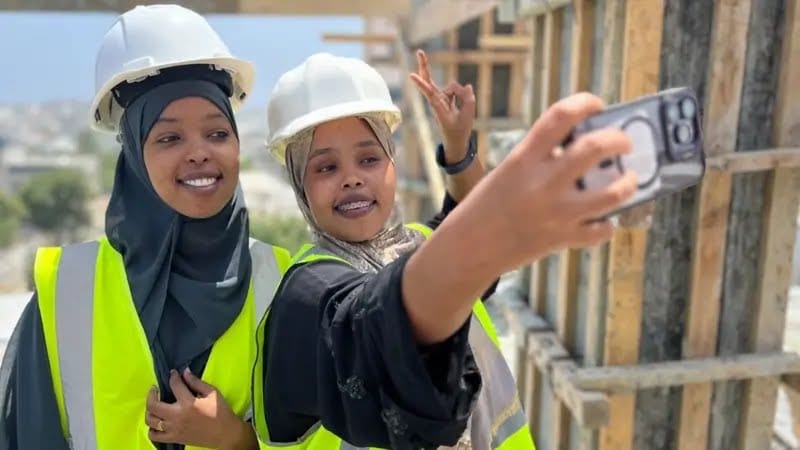As Somalia’s capital transforms its skyline with cranes, concrete, and high-rise ambition, two young female engineers are making their mark—not only as builders of infrastructure but as symbols of a new Mogadishu.
Fathi Mohamed Abdi and Saadia Ahmed Omar, both just 24 years old, are at the forefront of Somalia’s construction renaissance. Wearing hard hats and high-visibility vests, they navigate bustling construction sites with confidence, overseeing multimillion-dollar projects in a field historically dominated by men.
“When I started, many questioned my ability simply because I was a woman,” says Abdi, now chief operating officer of Arkan Engineering Services, a Somali-owned firm. “But today, I lead teams, manage budgets, and see my city changing—knowing I’ve had a hand in that change.”
Their journey hasn’t been easy. Born during Somalia’s civil war, Abdi and Omar grew up amidst conflict and destruction. But instead of leaving, they chose to stay—and rebuild.
“Mogadishu needs us,” says Omar. “We are not just building apartments; we are restoring the soul of our city.”
Over the past five years, more than 6,000 new buildings have risen across Mogadishu, driven by diaspora investment, improved security, and a surge in demand for housing and office space. But with growth comes responsibility—and risk.
Veteran architect Siidow Cabdulle Boolaay warns that construction is outpacing regulation. Issues such as unsafe building materials and a lack of fire safety measures threaten both the integrity of new structures and the well-being of residents.
“The architecture of old Mogadishu is being lost, and new buildings don’t always meet safety standards,” Boolaay notes.
Despite these concerns, the Somali Engineers Association sees the current boom as a turning point. Ibrahim Abdi Heyle, the association’s chairman, says the demand for skilled labor is creating long-overdue opportunities for women in engineering.
“Women bring new perspectives, and their presence is critical,” Heyle affirms. “They are reshaping not just buildings—but mindsets.”
Abdi and Omar have already led over 30 major construction projects. Both are graduates of Plasma University’s civil engineering program and credit their success to persistence and mentorship—however rare it may be for women in the field.
“There were times we were rejected from internships just because we were women,” recalls Omar. “But we never gave up.”
Challenges remain. Mogadishu lacks a proper sewage system, and unregulated borehole drilling threatens groundwater resources. Climate experts warn that unchecked urban growth could deepen inequality and strain basic services.
Still, the determination to turn Mogadishu into a model for post-conflict recovery is strong. Plans for new building codes, environmental protections, and infrastructure upgrades are underway.
“We are proving that Somali women can lead, design, and deliver,” says Abdi. “This isn’t just about concrete—it’s about hope.”
Omar agrees: “When I walk through the city and see a building I helped raise, I know we’re building more than structures. We’re building the future.”



